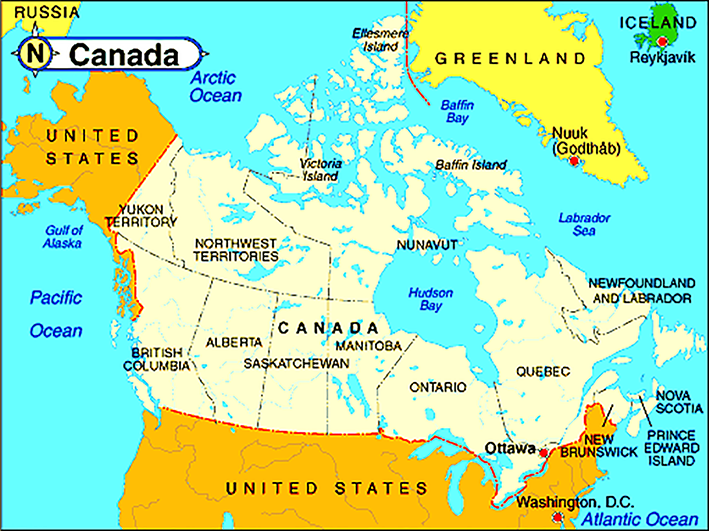International Relations
India and Canada to re-launch the Comprehensive Economic Partnership Agreement
- 12 Mar 2022
- 6 min read
For Prelims: Interim Trade Agreement, Free Trade Agreement.
For Mains: Significance of India-Canada Free Trade Agreement.
Why in News?
Recently, India and Canada held the fifth Ministerial Dialogue on Trade & Investment (MDTI), where Ministers agreed to formally re-launch the negotiations for India-Canada Comprehensive Economic Partnership Agreement (CEPA) and also consider an Interim Agreement or Early Progress Trade Agreement (EPTA) that could bring early commercial gains to both the countries.
- Earlier, India and Australia announced that they are set to conclude an Interim Trade Agreement in March 2022 and a Comprehensive Economic Cooperation Agreement (CECA) 12-18 months thereafter.
What are the Key Points?
- The Interim Agreement would include high level commitments in goods, services, rules of origin, sanitary and phytosanitary measures, technical barriers to trade, and dispute settlement, and may also cover any other areas mutually agreed upon.
- The two sides emphasized cooperation in sectors such as pharmaceuticals and critical and rare earth minerals as well as in areas like tourism, urban infrastructure, renewable energy, and mining.
- Both countries agreed to undertake intensified work with respect to the recognition of Canada’s systems approach to pest risk management in pulses and market access for Indian agriculture goods such as sweet corn, baby corn and banana etc.
- Canada also agreed to examine expeditiously the request for Conformity Verification Body (CVB) status to APEDA (Agricultural and Processed Food Products Export Development Authority) for facilitating Indian organic export products.
- A CVB is an organisation that has an agreement with the Canadian Food Inspection Agency under subsection 14(1) of the Canadian Food Inspection Agency Act to assess, recommend for accreditation and monitor certification bodies.
- The Ministers acknowledged the significance of establishing resilient supply chains in critical sectors and exchanged views on collaboration in this area.
What is an Interim Trade Agreement?
- An interim or early harvest trade agreement is used to liberalize tariffs on the trade of certain goods between two countries or trading blocs before a comprehensive FTA (Free Trade Agreement) is concluded.
- Government’s emphasis on interim agreements may be tactical so that a deal may be achieved with minimum commitments and would allow for contentious issues to be resolved later.
- The problem, though, is that these early harvest schemes potentially target the low-hanging fruits, leaving the tougher goods and services for later.
- Early harvest agreements that do not graduate into full-scale FTAs are exposed to legal challenges from other countries that are members of the World Trade Organisation (WTO).
- It is often beneficial to negotiate the entire deal together, as an early harvest deal may reduce the incentive for one side to work towards a full FTA.
What is CEPA?
- It is a kind of free trade pact which covers negotiation on the trade in services and investment, and other areas of economic partnership.
- It may even consider negotiation on areas such as trade facilitation and customs cooperation, competition, and Intellectual Property Rights.
- Partnership agreements or cooperation agreements are more comprehensive than Free Trade Agreements.
- CEPA also looks into the regulatory aspect of trade and encompasses an agreement covering the regulatory issues.
- India has signed CEPAs with South Korea and Japan.
What is India’s Current Trade Relation with Canada?
- India is Canada’s 11th largest export market, and 12th largest trading partner overall.
- India's exports to Canada stood at USD 2.9 billion in 2020-21 as against USD 2.85 billion in 2019-20. Imports in 2020-21 were USD 2.68 billion as against USD 3.9 billion in 2019-20.
- Canada’s commercial priorities in India are targeted at India’s policy objectives and sectors where Canada has a comparative advantage. These priorities include:
- Supporting India’s energy security ambitions through increased exports of conventional and nuclear energy as well as clean and renewable energy technology,
- Helping India meet its substantial urban and transportation infrastructure needs through provision of financing, equipment, technology and engineering services,
- Enhanced education and skills training through greater collaboration between Canadian and Indian educational and technical skills institutions,
- Commercial research and development to drive innovation in such sectors as information and communications technologies,
- Increased exports of food products and fertilizers to support India’s food security needs.





